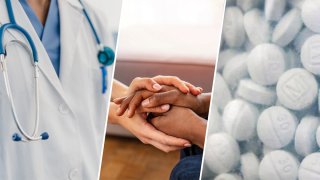
This report is part of News4 and Telemundo 44’s Fighting Fentanyl series. Go here for full coverage.
If you need help for a young person struggling with fentanyl use in the D.C. area, many resources are available, including for Spanish speakers.
How to find a treatment provider
FindTreatment.gov is a resource from the federal government that helps connect people with help treating substance use disorders, including finding substance use treatment, detoxification and medication therapy. The site has a search option for providers who offer care for children, adolescents and young adults. A version of the site is available in Spanish as well.
1-800-662-HELP is the national helpline of the U.S. Substance Abuse and Mental Health Services Administration. Callers can ask for help with treatment referrals. Texting your ZIP code to HELP4U is another way to get connected with help.
State agencies that oversee substance use treatment programs also connect families with resources. Go here to search for your state or D.C.
Providers who help young people and families in the DC area
Many facilities and organizations in the D.C. area help young people and their families as they struggle with fentanyl use. Here’s a handful of providers who work with children, teens and young adults, according to FindTreatment.gov and the News4 I-Team’s reporting.
Services offered by various organizations include individual and family counseling, medication-assisted treatment, relapse prevention help and treatment for co-occurring substance use disorder and mental health conditions. Groups vary in which services they offer and which age groups they serve.
DC
- Hillcrest Children and Family Center
- Latin American Youth Center
- Mary’s Center
- National Capital Treatment & Recovery
- New Hope Health Services
Maryland
- Johns Hopkins Suburban Hospital Addiction Treatment Center
- K&I Healthcare
- Lantern Therapeutic Services
- Life Spring Counseling and Consulting
- Maryland Treatment Centers
- Mary’s Center
- MedStar Montgomery Medical Center
- Newport Academy
- QCI Behavioral Health
- Sandstone Care
- Vesta
- Washington Behavioral Health
Virginia
- Aquila Recovery of Virginia
- The Chris Atwood Foundation
- Fairfax-Falls Church Community Services Board
- Inova Kellar Center
- Insight Recovery Centers
- Manassas Addiction Center
- National Capital Treatment & Recovery
- New Paradigm Recovery
- Sandstone Care
- Timber Ridge School
How to research a treatment provider
It’s important to make sure any provider you see is licensed. To check whether a health provider is licensed in D.C., go here. For Maryland’s physician search, go here. For Virginia’s health professional license search, go here.
A number of organizations accredit rehab facilities. Ask a provider which accreditations they have.
Help finding treatment in DC
D.C.’s Department of Behavioral Health can help connect families with treatment related to drug use. “No District resident will be denied treatment because of an inability to pay,” a resource page from the department says. Go here for more info. The department’s 24-hour Access HelpLine is 1-888-7WE-HELP.
Help finding treatment in Maryland
Maryland residents can search for resources related to substance use on this page from the state.
Help finding treatment in Virginia
In Virginia, community service boards help connect residents with treatment in their area. Go here for information from the Curb the Crisis campaign by the commonwealth.
Go here for information on Virginia’s fentanyl awareness initiative called It Only Takes One. Many resources in the commonwealth are listed.
Help getting health insurance for young people
The Medicaid and Children’s Health Insurance Program (CHIP) offers free and low-cost insurance for children and teens. Go here to see options in your state or D.C.
Help getting health insurance when young people are undocumented
In D.C., the Immigrant Children’s Program provides health coverage to people under 21 who are not eligible for Medicaid, depending on their income. Go here for info.
Maryland offers guidance on health insurance available to residents according to their immigration status. Go here for info.
In Virginia, insurance is available on the commonwealth’s insurance marketplace to U.S. citizens, U.S. nationals and “lawfully present immigrants including DACA recipients.”
The National Immigration Law Center has a map showing what health care is available to immigrants, depending on their status.
What to know about paying for treatment
The U.S. Substance Abuse and Mental Health Services Administration offers guidance on understanding the cost of treatment, whether or not you have insurance. They point out that some facilities offer free or low-cost care, and grants and scholarships are sometimes available.
Know your rights related to insurance coverage
A federal law “requires health insurers and group health plans that offer mental health and substance use disorder benefits to provide the same level of benefits for mental and/or substance use treatment and services that they do for medical/surgical care,” the U.S. Department of Health and Human Services says. Go here to learn about your rights related to insurance coverage.
What to know about naloxone
The opioid-reversal drug naloxone, often known by the brand name Narcan, can save lives, the U.S. Drug Enforcement Administration says in its One Pill Can Kill campaign for young people and families.
Naloxone is available for free in D.C., including by mail, the city says here. Maryland has a map of where it's available. Virginia’s health department recommends checking with local health departments, health care providers and stores.



